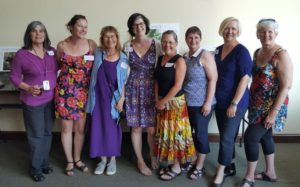~courtesy of Jim Caufield and The Perry News
The opening of “River Stories: Views from an Iowa Watershed” Sunday, June 13, at the TownCraft Center in Perry revealed scenes both of natural beauty in the Iowa landscape and of degradation caused by methods of modern industrial-scale agriculture.
Six women landowners — Courtney Turnis, Chris Henning, Jan Kaiser, Danielle Wirth, Patti Edwardson and Colleen Radebaugh — created an exhibit that documents their experiences in the watershed through photographs and short narratives, what they called “photostories.”
Angie Carter, professor of sociology and sustainable agriculture at Augustana College in Rock Island, IL, coordinated the “River Stories” project, which was funded by a grant from the Leopold Center for Sustainable Agriculture at Iowa State University.
Co-sponsors were the Women, Food and Agriculture Network and the Raccoon River Watershed Association. Iowa State University sociology professor Betty Wells also had a hand in the planning.
“The idea was to find a way to talk about conservation in a new, less politicized way,” Carter said at the reception for the six photographers. She said the Des Moines Water Works lawsuit against three northwest Iowa counties’ drainage districts has sharpened and polarized discussions of land stewardship and conservation in Iowa.
A notable element of the exhibition is the attention it draws to the large number of women who now find themselves owners of Iowa farmland.
“As a fifth-generation female farm owner, I was surprised to learn how many Iowa farms are owned by women, with the numbers predicted to grow even higher in the next 20 years,” said Jan Kaiser of rural Woodward, one of the six women exhibiting their “photostories”. “Working with these women has inspired me to spend time learning more about the importance of crop rotation, cover crops and protecting our water sources.”

Danielle Wirth, a professor of environmental science and policy at Drake University, showed photos of a 150-year-old bur oak on her Boone County savanna that was recently lost due to changes in land-management practices on nearby farms, in particular the installation of new subsurface field tile that increased the flow rate in the intermittent creek that fed the oak for more than a century.
For more information about “River Stories” call 515-337-3908.
